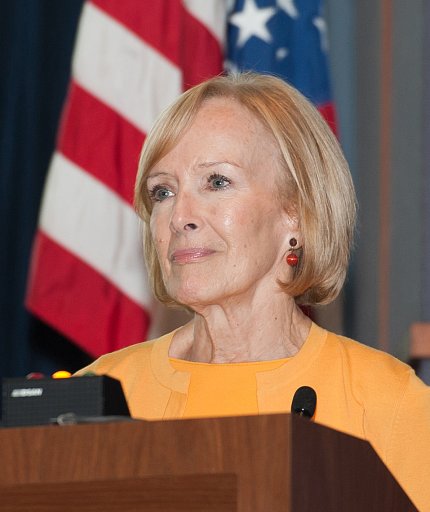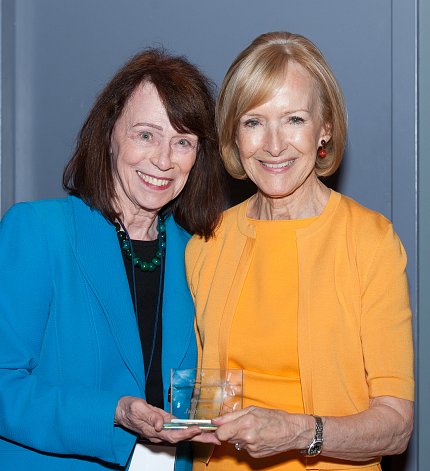Unheralded Heroes
Woodruff Shares Personal Story as Caregiver to Son

Photo: Marleen Van Den Neste
They may not have the medical expertise, but nobody else could be more devoted to the patient. They’re the informal caregivers—the relatives and friends of chronically ill patients—who selflessly spend many grueling hours daily caring for their loved ones.
The caregiver role came about unexpectedly for Judy Woodruff, anchor and managing editor of PBS NewsHour, who delivered the keynote recently at a 2-day NINR Science of Caregiving Summit in Natcher Bldg. Her oldest child Jeffrey, now 35, was born with mild cases of spina bifida and hydrocephalus, conditions that were kept largely under control until one fateful day in his teens.
As a child, Jeffrey needed some extra help. His conditions left him with learning issues and frequent incontinence; he also needed physical therapy. But he was a smart, adventurous child who loved to swim and ski and did well in school, recounted Woodruff.
“Despite our frantic worries, Jeffrey thrived,” she said. “He grew to be a little boy we couldn’t even keep up with.”
As a teen fascinated with science, Jeffrey began interning across the HHS agency circuit, first with the CDC, then NCI. He’d just begun interning at FDA when everything changed.
At age 16, Jeffrey underwent routine surgery, but something went awry. He emerged with impaired vision, speech and memory and was unable to walk.
“He was never to be the same person, except on the inside,” said Woodruff, who has since become an advocate for people with disabilities and their caregivers. “Jeffrey was still the social being he’d always been...but he now required a lot of help to get through the day.”
Woodruff and her husband, Bloomberg View columnist Al Hunt, who were juggling demanding journalism jobs while raising three children, suddenly were thrust into the role of caregivers. They had to do everything for Jeffrey: urinary catheters every few hours, medicines throughout the day, dressing, bathing, assistance with feeding and mobility.
“Once we got over the shock of what had happened, we determined ourselves to make Jeffrey’s life as positive as possible,” said Woodruff. They got him the best wheelchair, hired speech, physical and occupational therapists and tried a range of treatments.
“We decided the only way to get through this was to be optimistic, to assume the best, to stay cheerful and to stay busy and I know all of this in the end has made a difference for Jeff,” Woodruff said. “We didn’t dwell on the bad stuff; we were always looking ahead.”
Jeffrey’s condition took a toll on the entire family. While they strove to remain positive, Woodruff said she regrets not taking time to grieve what they had lost. “We just leapt over the grieving process and jumped ahead to how we were going to make the best of it,” she said. “It’s important to acknowledge the sadness and the loss.”

Photo: Marleen Van Den Neste
Woodruff said Jeffrey understood what happened to him but never spent much time looking back. Determined to continue his studies, he graduated from high school with the daily help of a hired companion to get him around and assist with his school work. He went on to graduate from community college and then completed a 4-year residential program at a school in North Carolina for students with physical disabilities. “There was not a dry eye anywhere around on that commencement morning in 2010,” said Woodruff.
Jeffrey now lives in a group home in Westminster, Md., where staff provide round-the-clock support. Some are graduate students who have education costs defrayed while gaining invaluable experience working in the health care field.
“I see what they provide,” Woodruff said. “I know the amount of work it takes to take care of Jeffrey and the other individuals, and it is jaw-dropping. It is extraordinary, the work they do...I think it doesn’t get the appreciation it deserves.”
Grateful for access to resources she knows many Americans do not have, Woodruff said she has met and heard the concerns of many parent-caregivers during her advocacy work around the country. “And I think our country needs to do a much better job of recognizing the role of caregivers [who] have to be not only thanked but celebrated.”
Often physically and mentally exhausting, caregiving is a labor of love that plays a vital role in treatment and recovery. It has been receiving increased attention from research and policy communities, but more needs to be done.
More research is needed to improve the health and quality of life for caregiver and patient alike, said NINR director Dr. Patricia Grady, who introduced Woodruff and welcomed attendees to the caregiving summit. There are effective interventions, she said, to improve the informal caregiver’s knowledge and physical health and reduce the burden, anxiety and depression that often afflict caregivers.
Said Woodruff, “[It’s important to make] the American people aware—not that there aren’t many already aware due to personal circumstances...that this is a field that deserves our respect, recognition and indeed our celebration.”
